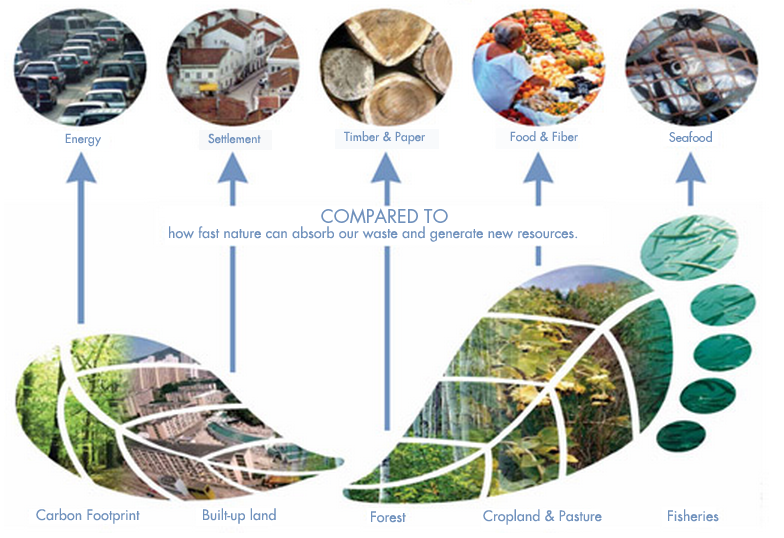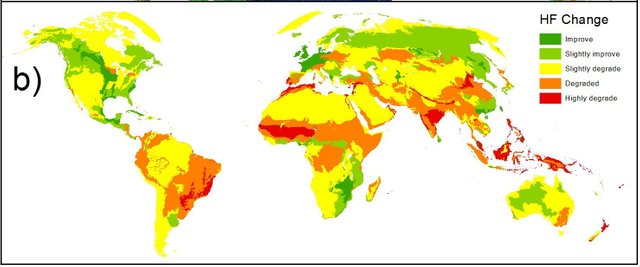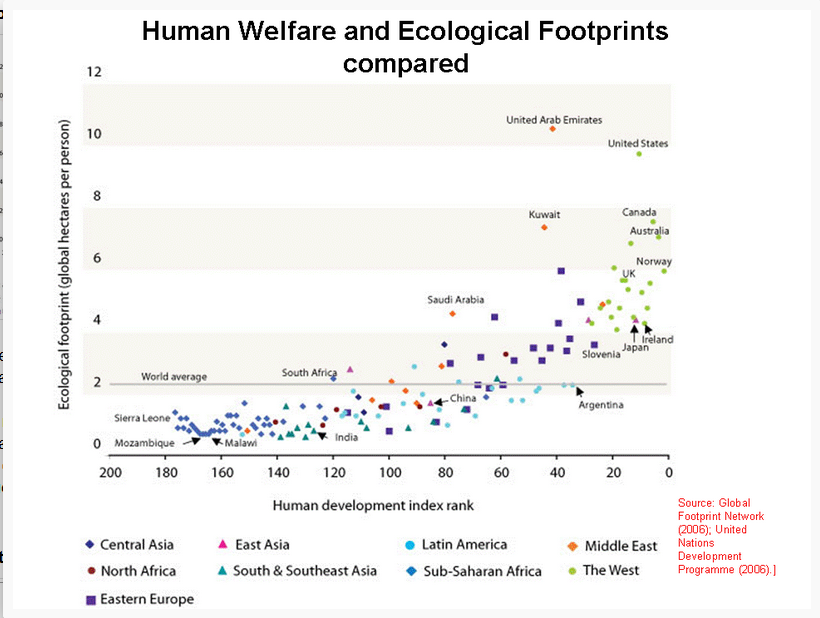HUMAN ECOLOGICAL FOOTPRINT
Ecological footprint defined
The ecological footprint measures human demand on nature, i.e., the quantity of nature it takes to support people or an economy. It tracks this demand through an ecological accounting system. The accounts contrast the biologically productive area people use for their consumption to the biologically productive area available within a region or the world (biocapacity). In short, it is a measure of human impact on Earth's ecosystem and reveals the dependence of the human economy on natural capital.

Footprint vs. economic growth
University of Northern British Columbia researcher Oscar Venter, lead author of the new study, said he and his colleagues had expected the human footprint to be closely linked to economic growth, but they found "there was a subset of countries which had managed to grow their economies while shrinking human footprint, which showed to us that maybe it was possible in some cases to decouple economic growth from environmental impacts, which is ultimately the direction that we'd want to head."
The countries that showed that pattern were generally wealthy countries with strong control of corruption, mostly in Western Europe, although Venter said Canada and the U.S. also did "fairly well." Increasing urbanization seemed to be the main factor driving the reduced footprint per person.
However, he added that the researchers are unsure whether these wealthy countries are simply "exporting their impacts overseas" by having other countries grow their crops and produce their goods.

While the researchers called the declining average footprint per person in some countries "encouraging," the maps also showed some bad news.
"Overall, the environmental condition had deteriorated quite a bit over the last 20 years," Venter said.
Only 3% of the world saw declines in human pressure, where as 71% saw average increase of 20% or more.
Well-being and Resource Consumption: An Imperfect Correlation
Those who are by disciplinary background inclined to judge how well we are doing using income and wealth as proxies still think that there are good reasons to believe that well-being, and even various comparative metrics of standard of living, do not exhibit a linear relation to resource consumption.

The chart is from the United Nations Development Programme, dated 2006. Compare the US ecological footprint with Norway's, for example. Both are at comparable positions on the well-being axis but the ecological footprints are vastly divergent. Well, actually, Norway is a bit ahead of the US on the well-being axis.
An even more striking comparison perhaps is between Japan and the US. Again, they are closely nested on the well-being axis, with Japan only a little behind, but with a far more significant difference in ecological footprint.
Other measures of well-being are likely to yield different results, but the point remains: not all improvements in standard of living or measures of well-being correlate with an upward rise in resource consumption - but most likely some correlation is generally found only until some threshold level of resource consumption is reached. After that, well-being and resource utilization often diverge sharply.
REFERENCES:
http://www.fewresources.org/ecological-footprints--human-impact-factors.html
http://www.cbc.ca/news/technology/human-footprint-1.3733738
https://en.wikipedia.org/wiki/ecological-footptrints
http://www.footprintnetwork.org/our-work/ecological-footprint/
Nice work, i hope you grow fast on steemit :)
Well written post. That graphic of the footprint is something I have not seen before. Looking at Africa with the human footprint, it would be nice to see them adopt green technology so they can leapfrog over the pollution of going through the coal phase in industry evolution. Of all the continents, Africa looks to be one of the main sources of future population growth as their industry evolves. It would be interesting to hear more from that area.
Food for thought!